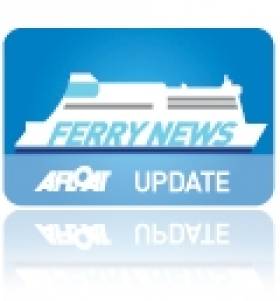Displaying items by tag: Dana Hollandia
Seatruck Sailings Start on Dublin-Heysham Route
The vessel has accommodation for 12 drivers. Most of the daily sailings depart Dublin at 15:15hrs and return from the Lancashire port at 02:15hrs. On certain days the schedules vary, to view the timetable click here.
In addition to the new route for Seatruck Ferries, the freight-only operator has a fleet of 8 vessels on routes between Dublin-Liverpool, Warrenpoint-Heysham and Larne-Heysham.
Anglia Seaways arrived into Dublin yesterday morning from Avonmouth Docks, where the 120 unit capacity vessel went into temporary lay-up period, since departing the Irish capital on 31 January (see related posting and photo).
The 13,073grt vessel revived the 8-hour route yesterday with an afternoon sailing bound for Heysham. The vessel was originally reported to be relocated to Baltic Sea operations, but with its charter to Seatruck, the DFDS Seaways funnel symbol of the Maltese cross was painted out.
Though, the Maltese cross can still be seen in Irish ports with calls made by sisterships, Dana Gothia (ex. Maersk Westland) and Dana Hollandia (formerly Maersk Waterford) which are part of the DFDS Group container subsidiary DFDS Logistics.
In total the Lo-Lo shipping division operates four vessels on several routing options with weekly calls to Belfast, Dublin, Cork and Waterford to Rotterdam and Zeebrugge.
The German built sisters originally operated Dublin-Rotterdam and Waterford-Rotterdam routes for Norfolk Line (a subsidiary of Maersk / A.P. Moller Group).Incidentally Maersk /Norfolkline also owned the Anglia Seaways until DFDS Seaways purchased the vessel last year.






























































